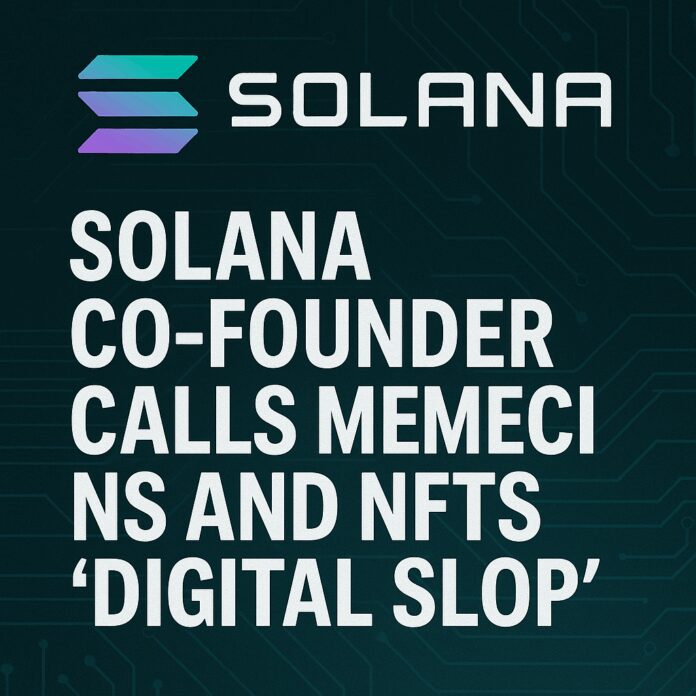Anatoly Yakovenko’s critique of memecoins and NFT culture as “digital slop” is resonating — and polarizing. While builders applaud the call for substance, traders and creators see it as an attack on crypto’s cultural economy. The question is: can a network thrive while rejecting its own demand drivers?
The context: Solana’s internal cultural rift
As reported by Cointelegraph, Solana co-founder Anatoly Yakovenko recently described large swaths of the chain’s activity — namely memecoins and NFTs — as “digital slop” that may be harming the ecosystem’s long-term credibility.
His concerns include:
- Spam-like NFT drops with little artistic or cultural value
- Memecoin proliferation that clogs blockspace and undermines serious applications
- An increasing dominance of short-term speculation over long-term utility
- A reputational disconnect between Solana’s technical achievements and its perceived usage
Yakovenko stopped short of proposing censorship or bans, but made it clear:
The ecosystem is drifting toward noise, not signal.
Why this matters: Crypto culture vs. crypto infrastructure
This tension is not unique to Solana — it’s foundational to the crypto industry:
- On one side: culture-first growth (memes, NFTs, viral speculation, community hype)
- On the other: infra-first maturity (payments, tokenized assets, DeFi tooling, RWA integrations)
The irony?
Memecoins and NFTs arguably saved Solana from post-FTX irrelevance, driving liquidity, attention, and active users. But Yakovenko is warning that if that’s all the chain becomes, it will never earn institutional trust or sustainable adoption.
RatEx42 perspective
1. Substance vs. speculation is a false binary
A healthy ecosystem needs both. Memecoins can drive network effects, but must be coupled with clear rails for capital, smart contract integrity, and institutional-use capacity.
Solana risks alienating its creative base without offering builders a credible alternative.
2. Cultural capital is economic capital
NFTs and memecoins aren’t just fun — they’re market narratives, liquidity vehicles, and in some cases, onboarding ramps to broader adoption. Dismissing them as “slop” may win developer applause, but it ignores how attention cycles fuel growth.
3. Solana needs strategic curation, not moral judgment
The solution isn’t to shame creators. It’s to incentivize real utility — with grants, better RPC protections, anti-spam mechanisms, and tooling that favors longevity over virality.
RatEx42 will begin scoring ecosystems on:
- Utility-to-noise ratio
- Developer incentives
- On-chain governance responsiveness to culture shifts
Final word
Yakovenko’s critique is valid — but risks sounding like an elite engineer talking down to the messy community that actually drives adoption.
Memecoins and NFTs are not the problem. The lack of structured curation and infrastructure-first incentives is.
Solana must evolve — but evolution doesn’t mean exile.
More ecosystem analysis at RatEx42.com




